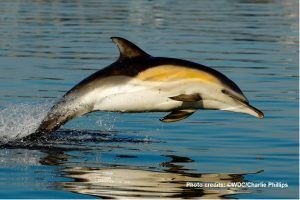
A blog by Julia Pix, WDC communications manager and Goodbye Bycatch campaign manager
Thank you to everyone who’s got involved with our campaign to stop dolphins, porpoises and whales dying in fishing gear in UK seas to put fish and shellfish on our plates. We’ve loved seeing all your support on social media and appreciated every single person who took action by emailing the fisheries minister or contacting their MP, MSP, AM or MLA. We are so grateful to have such brilliant supporters and, even though they don’t know it, dolphins, porpoises and whales are lucky have you on their side!

More than 10,000 of you sent a message to your fisheries minister and so we know that your voices have been heard, although we wait to see what action will be taken. We’ve received responses from Rebecca Pow, UK Parliamentary Under Secretary of State for Environment, the Northern Irish fisheries minister’s office and the Welsh Fisheries Minister, Lesley Griffiths. At the time I’m writing this, we have not yet received a response from the Scottish fisheries minister.
Ministers’ responses
The UK government will be publishing what it’s calling a ‘UK Bycatch Plan of Action’ later this year. They have described this process as ‘stakeholder-led’ and we are one of the stakeholders involved. This plan will outline the actions that will be taken to tackle the bycatch of dolphins, porpoises and whales as well as seabirds, seals, sharks, skates and rays in UK waters ‘in a practical and risk-based way.’ Rebecca Pow added that ‘Defra is undertaking trials for a range of mitigation measures in different fisheries along Cornwall’s south coast and will be looking to include more fisheries in this over the next 12 months.’
Northern Ireland responded that ‘any accidental catch of cetaceans [the collective term for dolphins, porpoises and whales] is unwelcome and the Department of Agriculture, Environment and Rural Affairs (DAERA) is fully supportive of measures to reduce accidental catch of cetaceans.’ The response also stated that ‘there is no tuna fishery in Northern Ireland waters, and no static gill net fishery in Northern Ireland. DAERA will be discussing guidance for pot fishing with our Inshore Fisheries Partnership Group during 2021.’ We’re glad to hear that Northern Ireland has no gill net fisheries, as these are responsible for more dolphin and porpoise deaths in the UK and globally, than any other types of fishing gear. We are also pleased to hear that DAERA are discussing guidance for pot fishing – where entanglement in pots appears to be of the greatest concern in Northern Irish waters.
The Welsh response included that they are ‘fully committed to tackling bycatch’.
Local voices
Lots of you also emailed your own constituency MP, MSP, AM or MLA. Many of those who have responded have promised to raise the issue with the minister so this really helps us to raise the profile of the issue on the political agenda. Thank you for forwarding their responses to us – this is so helpful as it enables us to understand their different perspectives and identify and engage with those who might be willing to help us to continue to push this issue, including in parliament.
Questions raised
We’re delighted that as a result of our campaigning efforts, Parliamentary Questions have been raised by Lord Randall in the House of Lords and Luke Pollard MP, Shadow Fisheries Minister, in the House of Commons in Westminster. Parliamentary Questions, or ‘PQs’ are tools used by Members of Parliament to seek information and press for action, hopefully providing us with clarity about government policy. All answers are publicly available and you can read them at the links below:
- Luke Pollard MP question 1
- Luke Pollard MP question 2
- Luke Pollard MP question 3
- Luke Pollard MP question 4
- Lord Randall’s question in the House of Lords
What’s next?
This phase of our Goodbye Bycatch campaign has now closed but our efforts to make UK seas safer for dolphins, porpoises and whales continue as the UK and devolved governments shape their policies. We will ask for your help again when the need and opportunities arise to keep up the public pressure.
Meanwhile, we will continue to engage with government departments to take every opportunity to tackle bycatch. For example, we look forward to helping with the development of practical, effective bycatch policies in the UK and devolved governments’ Joint Fisheries Statement (due in 2022) and Fisheries Management Plans to ensure bycatch ambitions are adequate within them. The cetacean bycatch plan of action is due to be published this year and we will press government agencies to maintain this issue as a priority, to implement required measures urgently and to collect evidence that demonstrates that deaths are being continually reduced and prevented.
We will continue to work with fishers to improve fishing measures at sea, to prevent bycatch. We have been working with the Scottish Creel Fishermen’s Federation and other partners to understand the levels of entanglement in creel fisheries, and we will be publishing this work in coming months. We hope that this work will expand to cover the rest of the UK with a wider range of partners. We also hope to increase our understanding of alternatives to gill nets.
We are also working with ASDA to influence the fish and shellfish supply chain, with bycatch in mind specifically. We will continue to press ASDA, and other UK supermarkets in the future, to improve bycatch measures in the fisheries that supply their stores.
In it together
Once again, thank you for playing your vital part. Long-running campaigns like this require a combination of behind the scenes political engagement from experts like our Goodbye Bycatch campaign lead, Sarah Dolman, and public pressure from people like you.
More than 1,000 dolphins, porpoises and whales die in fishing gear in UK seas every year – together we will reduce this to the occasional tragic accident. Together we will say Goodbye Bycatch.
Follow @whalesorg
The Goodbye Bycatch campaign page can be found here
